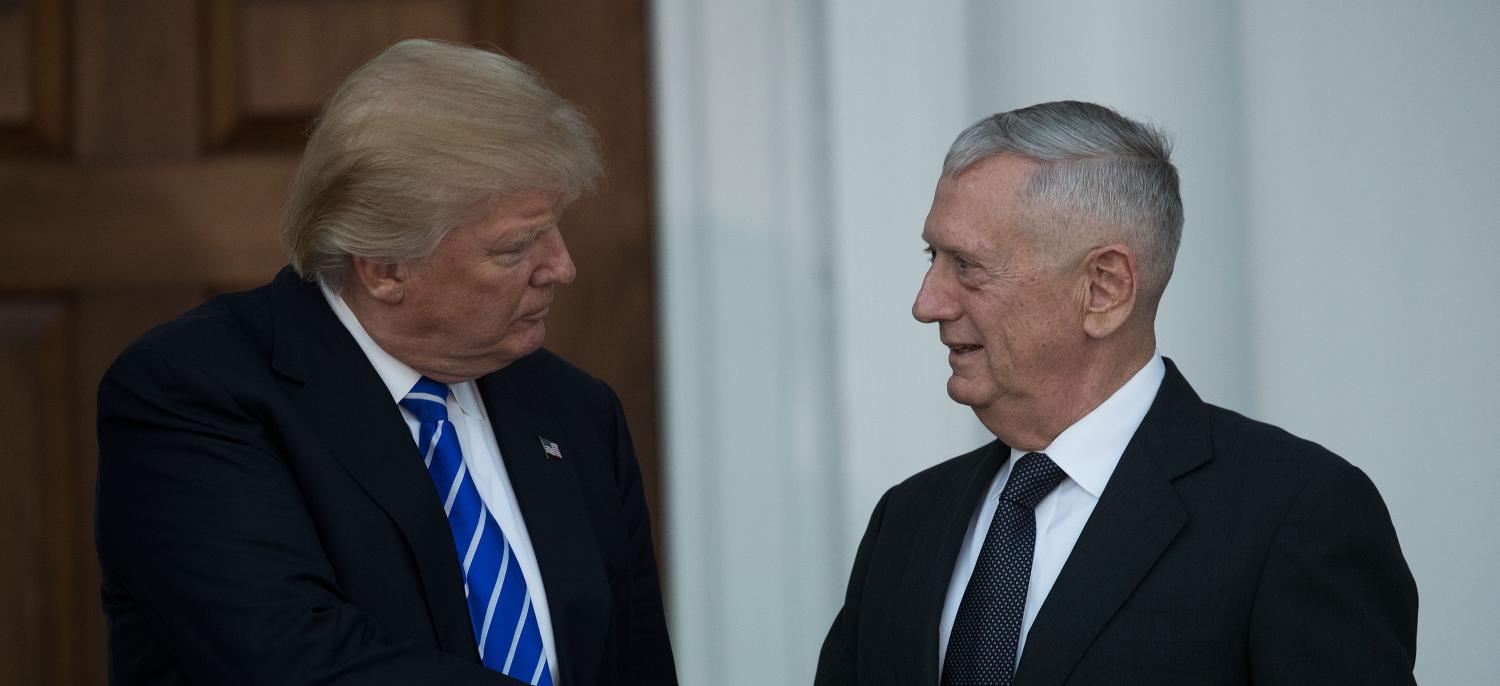When Donald Trump at the weekend revealed the identity of his nominee for defence secretary he referred to him by his soubriquet: Mad Dog.
He also likened retired Marine General James Mattis to Trump’s own military hero, General George Patton whose World War II exploits as an aggressive armoured warfare commander were captured in the movie Patton, starring George C Scott.
Scott received an Academy Award for his performance.
In the process he imprinted Patton’s aggressive, take-no-prisoners persona on popular imagination, including apparently, a future president of the United States who was then in his twenties and embarking on a hard-charging Patton-like career in real estate development.
'We are going to appoint "Mad Dog" Mattis as our secretary of defence,' Trump told a cheering crowd in Cincinnati, Ohio, on a victory tour. 'They say he’s the closest thing to General George Patton that we have.'
On the face of it, a president-elect’s choice of a retired general with recent service in the Middle East as his defence secretary might add to concerns about a militarisation of a Trump administration.
Mattis will join retired general and designated national security adviser Michael Flynn in the Trump security team, along with other military retirees in the higher echelons of a new administration.
Already, critics of the shape of a Trump administration are talking about a 'junta' in command of US security policy.
But leaving aside for the moment the principle of civilian control of the military enshrined in an act of Congress that forbids - unless contradicted by special legislation - officers from serving as defence secretary for seven years after retirement, Mattis represents an intriguing choice.
On the evidence, he has the intellectual heft and on-the-ground experience for a most challenging assignment at a time when long-assumed American security prerogatives are being challenged more or less across the board; from Europe, to the Middle East, to the Asia-Pacific.
Mattis has served as military commander in the field in the Middle East and as chief of Central Command, among other top level military posts in and out of Washington in a long and distinguished career.
However, the question will remain – this will be subject of reasonable scrutiny in the nominating process – whether he has the political acumen to deal with an extraordinarily complex array of challenges as part of a White House team whose mercurial chief executive will not necessarily apply a steady hand to the business of government.
Mattis’s circumstances are being compared with those of general George C Marshall who became defence secretary under president Harry Truman and before that as Secretary of State was author, among other achievements, of the Marshall Plan that enabled Europe’s emergence from the rubble of World War II.
Marshall himself required congressional legislation to serve in a civilian role, but at this stage it is drawing a long bow to compare Mattis with Marshall, or a Trump administration with the Truman years.
Historical circumstances are entirely different and challenges, if anything, much more complex in an emerging multipolar world in which US hegemony is being put to the test in many different theatres.
What then do we know about Mattis from a preference and policy standpoint beyond the cardboard cut-out character captured by his nick-name as a hard charging Marine general who is on the record as saying 'it’s fun to shoot some people'?
A confirmed bachelor, he has been referred to as a 'warrior monk' closeted with a library of 7000 volumes, much of it military history, and no television.
Like the Iraq war commander and former Central Intelligence Agency head general David Petraeus (also under consideration for an administration post) Mattis has distinguished himself as a cerebral general, altogether more complex than his cartoonish reputation.
What we do know that is relevant to the present is that he does not like the Iran nuclear deal (but he is realistic about challenges of shelving it); he is well versed in the complexities of Middle East politics and has been a critic of Israel’s settlement policies (he has described these policies as 'unsustainable') while reaching out to the Israeli military; he was an internal critic of the Obama administration’s policies in Syria (he wanted to do more to arm the Syrian rebels and his early retirement from his post as commander of Central Command may have been linked with these disagreements and others such as his distaste for the Iran deal); and his views of the need to bolster alliance relationships are at odds with the isolationist tendencies that surfaced during the Trump campaign.
We can be fairly sure on his record he will be his own man.
From an Australian perspective Mattis would seem to be a somewhat less concerning choice than others mooted, notwithstanding reservations we might share about the blurring of lines between civilian and military control of defence forces.
Compared with designated national security adviser Flynn who led 'lock her up' campaign chants aimed at Hillary Clinton during Trump campaign rallies James Mattis has nothing in his record to suggest he is a crude partisan.
Indeed, he was courted by both the Trump and Clinton campaigns.
On the other hand, given the uncertainties surrounding the shape and direction of the Trump administration more generally it would be wise for us to reserve judgement.
Photo by Jabin Botsford/The Washington Post via Getty Images

